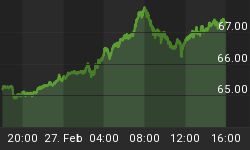Prechter and Kendall's "All the Same Market" Analysis Shows how Diversification Can't Protect You from Correlated Risk
A dear friend of mine wants to celebrate an important health milestone by going skydiving with friends. She feels happy and healthy and excited. She wants to do something very thrilling to celebrate.
I'm going to help my friend celebrate, by way of something very mundane: I intend to photograph the event from the ground. Of course I'm excited to be there, and I understand my friend's motivation -- it's just that I am not a thrill seeker (especially when it comes to heights)!
Similarly, I don't take big risks with my investments. I'm sure it's a thrill to make a million, but the risk of losing all my capital is too terrifying for me to stomach.
When I started to research my investment choices, the idea of "portfolio diversification" made a lot of sense to me. All of the "experts" said it's the key to reducing risk. It seemed safe in the same way that ropes and pulleys could really help a novice enjoy rock climbing or the trapeze.
But then I came across this gem of investing wisdom, written in terms that I understood on a visceral level:
Recommending diversification so that novices can reduce risk is like recommending that novice skydivers strap a pillow to their backsides to "reduce risk." Wouldn't it be more helpful to advise them to avoid skydiving until they have learned all about it? Novices should not be investing; they should be saving, which means acting to protect their principal, not to generate a return when they don't know how. ~ The Elliott Wave Theorist (April 29, 1994)
I can appreciate the metaphor.
What fascinates me even more is how this contrary view of diversification is magnified when you consider how markets can correlate.
In Conquer the Crash, Robert Prechter and Pete Kendall first put forth their "All the Same Market" hypothesis, stating that in the Great Asset Mania and its bear market aftermath, all markets "move up and down more or less together...as liquidity expands and contracts."
Consider, for instance, the tried and increasingly debilitating strategy of diversification. With the market smash extending across every investment front but cash, one might think that this concept would at least be challenged by now. But it remains a virtually uncontested truism among market advisors and their followers. ~ The Elliott Wave Financial Forecast (Oct 31, 2008)
The first edition of Conquer the Crash published in 2002; since then, our analysts have produced a multitude of chart-based evidence to demonstrate the coordinated trends across diverse financial markets.
Ready to turn in your pillow?
Anyone interested in making informed financial decisions can benefit from our newly available "Death to Diversification" eBook, which explains more about how you can avoid the false security of a diversified portfolio.
As a Club EWI member, we are proud to offer you this new FREE e-book: You can see for yourself the kind of analysis our subscribers have received and used for over 30 years.
Click here to login or sign up for instant access.
This article was syndicated by Elliott Wave International and was originally published under the headline Parachutes vs. Pillows: Why Diversification Doesn't Work. EWI is the world's largest market forecasting firm. Its staff of full-time analysts led by Chartered Market Technician Robert Prechter provides 24-hour-a-day market analysis to institutional and private investors around the world.















